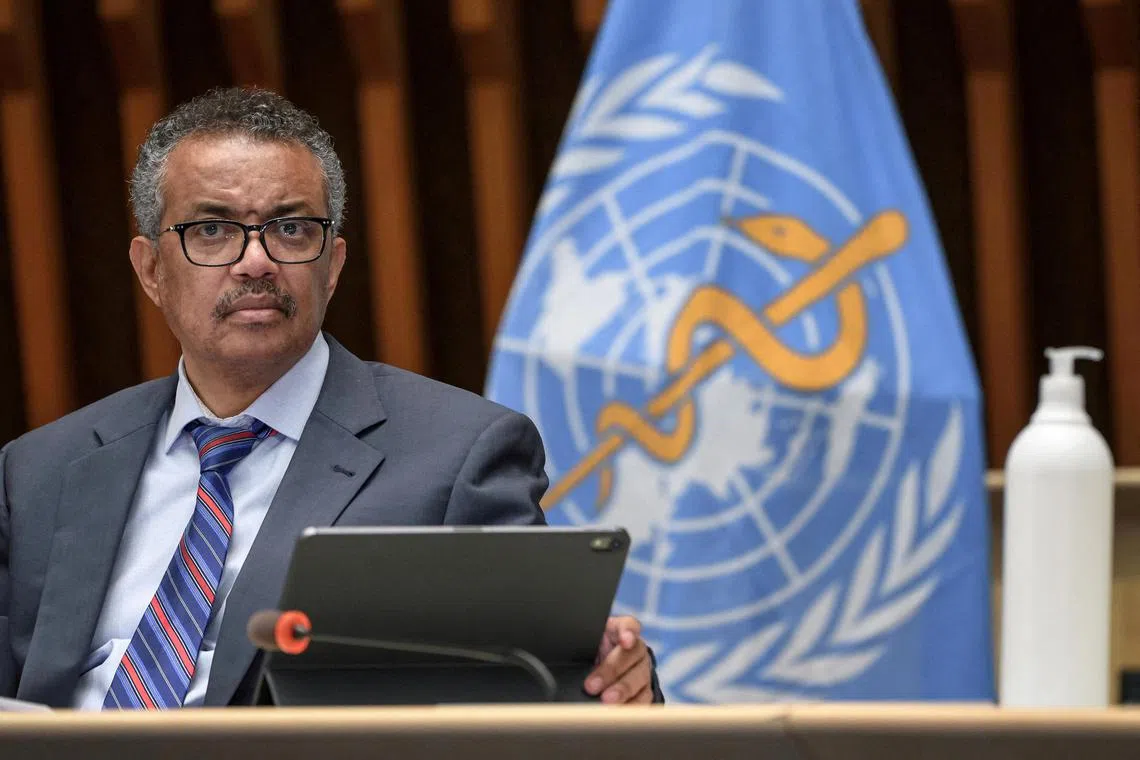WHO chief Tedros ‘confident’ of eventual pandemic treaty deal
Sign up now: Get ST's newsletters delivered to your inbox

WHO chief Tedros Adhanom Ghebreyesus is pushing for a global pandemic-preparedness pact.
PHOTO: REUTERS
Follow topic:
GENEVA – The head of the World Health Organisation (WHO) on May 27 voiced confidence that countries would one day reach a deal on a pandemic accord after failing to produce an agreement last week, although health officials warned it could take years.
Health officials have voiced frustration with the negotiations that have been dogged by lengthy discussions past midnight, last-minute shifts in position and growing criticism from right-wing commentators that the treaty would undermine sovereignty, which the WHO strongly denies.
In a symbol of the resistance, a truck with a sign reading “NO to the Pandemic Treaty. STOP the UN Power Grab” was seen near the UN headquarters in Geneva where the talks are taking place.
Ministers from among the WHO’s 194 member states are seeking to wrap up more than two years of negotiations on new rules for responding to pandemics during the May 27 to June 1 World Health Assembly after Covid-19 killed millions.
Negotiators failed to clinch a deal
“Of course, we all wish that we had been able to reach a consensus on the agreement in time for this health assembly and crossed the finish line,” WHO chief Tedros Adhanom Ghebreyesus said.
“But I remain confident that you still will, because where there is a will, there is a way.”
Dr Tedros said the task before negotiators had been “immense, technically, legally and politically”, and that they were “operating on a very ambitious timeline”.
“You have demonstrated a clear commitment to reaching an agreement,” he said, adding that negotiators had “worked long days and nights”, closing meetings as late as 4am.
He hailed their dedication to push forward despite “a torrent of misinformation that was undermining your negotiations”.
While missing the deadline on May 24, countries have voiced a commitment to keep pushing for an accord.
Negotiators are due on May 28 to present the outcome of the talks to the assembly, and the assembly will take stock and decide what to do next.
“I know that there remains among you a common will to get this done, so, there must always be a way,” Dr Tedros said.
“Meaning the solution is in your hands,” he stressed.
A senior US administration official said Washington remained committed to the process, but estimated another one or two years of talks.
“There’s a lot of frustration,” she said.
A health diplomat said reforms to the process were being considered, as well as an extension of between five and 24 months.
Negotiations are still ongoing for an update to existing health rules on outbreaks and negotiators say that a deal is close, including on a new tiered system of alerts following criticism the WHO was too slow to declare a Covid-19 emergency.
Dr Lawrence Gostin, a professor at Georgetown Law in Washington involved in the negotiations, said the outcome was a “shameful abdication of political leadership” but voiced confidence the reforms would pass this week.
“They have enormous potential value for making the world safer and more equitable,” he told Reuters. REUTERS

